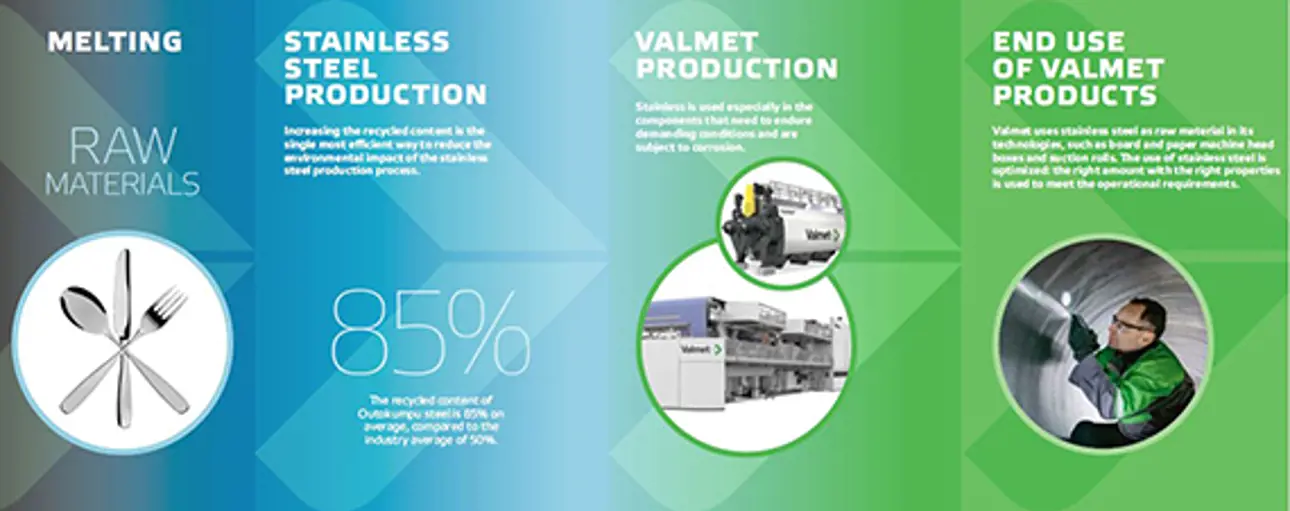Responsibility benefits the entire value chain
Jun 7, 2016
Valmet works systematically to ensure more responsible business practices throughout its global supply chain. Close collaboration with our suppliers also leads to increased customer benefits and enhanced transparency in the value chain. The circulation of stainless steel, a key material in Valmet’s technologies, well demonstrates how a seamless supply chain accumulates synergies.

Valmet strives to ensure that it operates responsibly throughout its entire value chain and that the materials and components it procures comply with relevant local and global regulations and standards. Our sustainability requirements for suppliers – the Sustainable Supply Chain Policy – act as the starting point
for entering into and maintaining all business relationships with Valmet. The policy applies to all Valmet’s suppliers in over 50 countries around the world.
“To be the responsible and trusted partner our customers and other stakeholders expect us to be, we need to ensure that sustainability is an integral part of our procurement process,” says Laura Puustjärvi, Head of Sustainability at Valmet.
Ensuring a sustainable supply chain
In order to ensure effective implementation of and compliance with its supplier sustainability requirements, Valmet has rolled out a comprehensive set of global activities, including supplier sustainability risk assessments, supplier self-assessments and auditing practices, as well as procurement personnel training.
The implementation of all these tools and practices is proceeding at a good pace. All 9,000 active Valmet suppliers have undergone risk assessments based on country of origin and purchasing category. About 74% of all Valmet purchases are sourced from low-risk countries.
The supplier sustainability risk assessment may lead to a self-assessment of a supplier’s sustainability performance, and finally – a supplier sustainability audit performed by third-party auditors and Valmet. In 2015, 41 supplier sustainability audits were conducted in Brazil, Mexico, China, India, the USA, Poland, Finland and Sweden.
Implementing the policy and related tools and practices is also a major effort internally.
“We have trained more than 380 procurement professionals from all over the company and nominated local sustainability coordinators to ensure effective implementation of the responsible procurement practices,” says Puustjärvi.
Full traceability – back and forward
To assess the impact of its value chain, Valmet strives to develop the transparency and traceability of its entire value chain – from the sourcing of raw materials to the end of its products’ life cycles.
One of the stainless steel suppliers Valmet cooperates closely with is the Finnish
company Outokumpu, which shares the same high interest in responsible business practices and supply chain transparency.
Outokumpu’s tracked data forms the basis of continually updated product statements and declarations. Using impeccable and ethically grounded processes, Outokumpu knows the origin of its virgin alloys, meaning customers can rest assured that conflict materials are excluded, to give one example. Additionally, strict controls are applied to the quality of recycled material.
“Outokumpu presents information on its products’ environmental and ethical profiles in an open and transparent manner, making it easier for customers to find out about our sourcing criteria,” says Camilla Kaplin, Outokumpu’s Senior Manager for Environmental Matters.
While Valmet has a similar system to document the materials used in its products, the traceability is guaranteed all the way back – and forward – in the supply chain. When a machine or a machine part produced by
Valmet has come to the end of its lifetime, the stainless steel and other raw materials used in them can be easily recycled due the detailed information Valmet provides.
High content of recycled material benefits all
Stainless steel is fully recyclable, and it can be recycled multiple times without losing any of its properties. In fact, steel is the most recycled material in the world. The recycled content of Outokumpu steel is 85% on average, compared to the industry average of 50%.
“Increasing the recycled content is the single most effective way to reduce the environmental impact resulting from the production process of stainless steel. The high recycling content, in turn, helps customers like Valmet – and their customers in turn – reduce their carbon footprint and save the earth’s resources, as less virgin material is needed for the products. Compared to the industry average, Outokumpu has a low carbon profile, as verified in our Environmental Product Declarations,” Kaplin explains.